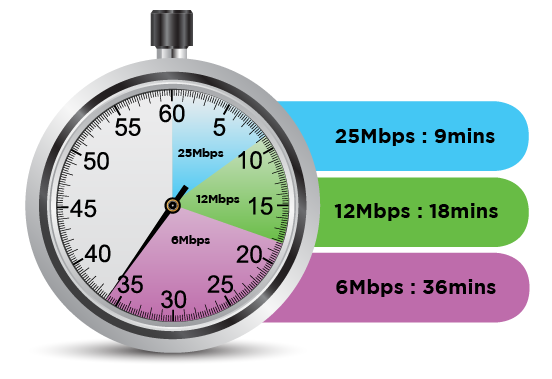It is important to pick a plan that matches your needs. Consider what services you are currently using and what you want your broadband plan to deliver.
You should make sure that all the services you want will work over Sky Muster. Some may not work and you may need to keep an existing telecommunications service. Check with your retail service provider if you are unsure.

IMPORTANT!
Services will not work in power outages.
Consider what alternative arrangements you need in case of power outages.
The key things to look out for in a plan:
Speeds
There are two speed levels that you can choose from;
- 12 (down) /1 (up) Mbps and
- 25 (down) /5 (up) Mbps.
What are download and upload speeds?
Speed is a measurement of the amount of data that can be sent to and from you in a second.
The quoted levels are the maximum speed that is achievable for the connection. Speed levels are not consistent and they often vary. The actual speed that you receive will vary depending on a number of factors, such as the type of information you are sending, the time of day, the number of applications sending and receiving files on your devices, your retail service provider and the number of other customers using the service.
For further information on performance, check out our information.
TIPS ON PICKING A SPEED TIER THAT SUITS YOUIf you download sizeable amounts of information (for example high definition movies or gaming), then the faster speed will likely mean that you are waiting less time for this information to be received.
If you only need the internet to access information that is small in size (for example basic websites, emails, individual songs, telephone calls), then the entry speed level might suit you perfectly.
If you are sending lots of files (for example if you operate a small business that updates websites or regularly sends important documents), then fast upload speeds are important for you.
EXAMPLE
The following graphic gives an estimate in the difference higher speeds might make for an activity. These times are estimates and may be affected by other factors, such as other people being online.
Downloading a standard definition movie (1.5GB)

Data
There are a number of plans available, offering allowances up to 150GB per month, divided into peak and off peak usage.
Note that both sent and received data (i.e. uploads and downloads) is counted in the allowance.
TIPS FOR PICKING A DATA ALLOWANCE THAT SUITS YOUHow much data you need depends on what you do and how long you spend online.
You should examine your previous bills to see how much data you have used for the last few months as a basis to calculate how much data you will need.
Checking email and browsing the internet uses very little data, watching videos uses sizeable data amounts, while gaming can quickly use up a lot of data.
Here are some estimated usages by activity as a guide: [note: 1024MB = 1GB]
Activity
Data usage
Email (100 sent/received without attachments)
2.5MB
Music streaming (3 minutes)
3MB
Radio streaming (10 minutes)
15MB
Email (10 sent/received with attachments)
18MB
General web browsing (30 minutes)
10 - 20MB
YouTube video streaming (5 minutes)
25MB
Audiobook (9 hours)
110MB
Downloading standard definition TV show
(45 minutes)
200MB
Downloading standard definition movie
(2 hours)
1 - 1.5GB
Downloading high definition movie (2 hours)
3 - 4.5GB
Downloading a game (e.g. for Xbox or PS4)
20 - 50GB
The average Australian uses 69GB of data a month (June 2015). Consumers who have an nbn connection tend to use more data, so it may be worthwhile considering a plan with more data than your existing plan. The average nbn user uses 131GB of data a month (June 2016)
Peak / Off peak
Plans divide the data allowance between peak and off peak times. Peak hours are between 7am and 1am at your local time (18 hours of the day). Off peak hours are between 1am and 7am at your local time (6 hours of the day).
Plans that offer data usage in off peak times are often better value for money, but may be at a time that does not suit your needs. Peak hours are likely to be the hours when you most want to use the internet.
Set up, equipment and other fees
Your retail service provider may charge other costs, besides the monthly cost, such as for set-up, equipment (router or Analogue Telephone Adaptor (ATA) for VoIP) or early termination fees. You should carefully check all the possible fees that apply with each plan as they differ with each retail service provider.
Length of contract
Some contracts are available month to month, while others have a minimum duration (such as one or two years). Longer contracts may not have up front equipment and connection fees, but will charge if you terminate the service early.
Better Internet for Regional, Rural and Remote (BIRRR) Group have produced a comparison of the price and inclusions offered by the different providers.
I run a small business from home; will there be special plans available for me?
Sky Muster will serve homes and small businesses. If you require a plan to be used for your business also, contact a retail service provider to discuss your options. Some plans are available to both residentiall and small business consumers. Further options are expected to be released in the future.
What is nbn’s fair usage policy?
nbn has set out a number of limitations on how much data each service can use in any four week period. This is designed to ensure that the service is shared equitably and not degraded for everyone.
Your retail service provider should ensure that you do not breach these conditions. You should discuss any concerns with your retail service provider.
Will I lose my current services?
If you have voice, broadband or alarm services through other fixed line, wireless or satellite services, you will likely be able to continue to use them (excluding nbn ISS services).
How do I track my usage?
Retail service providers allow you to check your data usage and alert you if you are close to using all of your allowance.
If you use all of your allowance your retail service provider is likely to significantly slow your speed until the next billing cycle.
Will the bill from my current service end the same day as my new service?
Perhaps. You should check with your retail service provider when the billing periods will begin for Sky Muster and end for other services. This may depend on whether or not you are switching retail service providers.
IMPORTANT QUESTIONS TO ASK YOUR PROVIDER1. Can I use all my current services with this plan?
2. How long will it take to get connected?
3. What do I need to do to prepare my property for connection?
4. Will my other satellite equipment be uninstalled at the same time?
5. When will the billing start?
6. What speed level will I get on average with this plan during peak and off perk hours?
7. Apart from the monthly charge, what other fees do I need to pay?
8. Do I need to purchase a new router?
9. Can I get VoIP services? Is the router set to ensure quality voice services?
10. How do I access my data tracking service?
11. Will there be any additional charges for connecting or fault repairs?
12. Is my property a standard installation? Can I cancel the service, without charge, if I am not a standard installation?
13. Do you offer service guarantees for fault rectification and outages?



